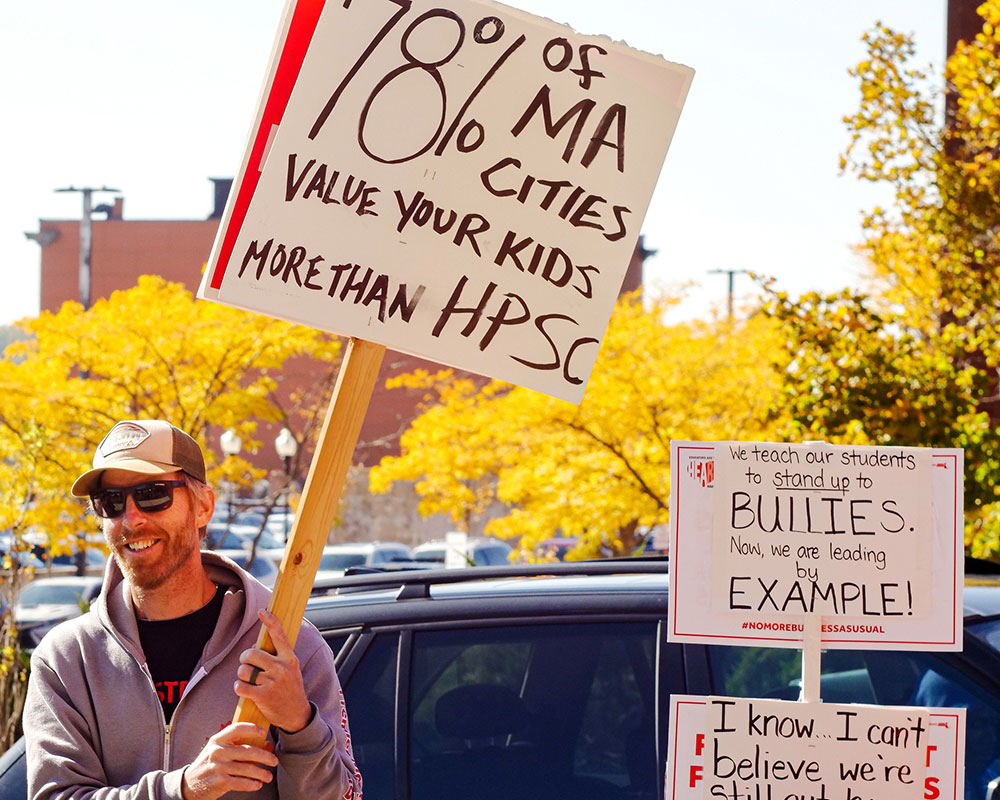Update: Although classes were cancelled earlier and school bus service is not available, a late settlement between the Haverhill School Committee and Haverhill Education Association means students may optionally return to school Friday.
During a joint press conference School Committee Negotiations Chairman Scott W. Wood Jr. and union President Tim Briggs announced resolution of differences around 11 p.m. outside Haverhill City Hall where they signed an accord.
Briggs said the resulting agreement brings “substantial investment in our public schools” and contract language regarding student safety and greater diversity among the teaching force.
Briggs said “return to work” language was the final sticking point. To which, Wood said it was never the School Committee’s intent to “retaliate” against teachers, but rather to get everyone back into classrooms.
Briggs thanked state Rep. Andy X. Vargas, Sen. Diana DiZoglio and the entire city legislative delegation at both the state and federal levels, U.S. Labor Secretary Marty Walsh, among others. He also thanked Mayor James J. Fiorentini for making money available to the School Committee.
—Earlier—
Haverhill public schools remain closed to students Friday with the issue of potential reprisals against teachers reportedly the lone problem.
In deciding to keep classrooms empty, school Superintendent Margaret Marotta said in an email to families only “one area remains in dispute” after six days of talks.
“I understand the pressure and frustration this puts on families. However, I have little power in the situation. Without teachers, our schools cannot safely function,” she explained. Marotta added, all missed school days must be made up since Massachusetts requires 180 days of student instruction.
According to an unconfirmed report, the last area of contention centers on the city’s insistence it reserves the right to punish teachers for their participation in the strike. Haverhill Education Association President Tim Briggs hinted at such a sticking point Wednesday when he said the two sides also have differences over a “return to work clause,” particularly about the city legally “coming after” individual teachers who participated in the strike.
After both sides Wednesday appeared to come to an agreement over teacher pay, but not contract language over student safety, School Committee Vice Chairman Toni Sapienza-Donais shook up the city team. She said Thursday morning School Committee member Richard J. Rosa, who helped negotiate the last pact between the city and union, would become the third member of the team.
A week ago, School Committee members prepared for what was a seemingly inevitable strike vote. At the time, the School Committee appeared to try heading off a teachers’ strike, reminding the Haverhill Education Association that walkouts by government employees are illegal in Massachusetts. The elected body, however, received push back from the start. A former teachers’ union president, Marc Harvey, criticized the administration’s release of a pamphlet that Harvey called misleading and designed to demonize the union and its members. The pamphlet alleged Haverhill teachers saw a 10% raise in their last contract.
“My W-2 form says something different. Our last contract says that we received an increase of 1.75 in the first year, 1.75 in the second year and 2% in the third year. Quick math tells me that adds up to a 5.5% raise over three years,” he said.
Harvey said longevity and step raises for education and experience were rolled into the figure to make raises appear larger.
School Committee member Paul A. Magliocchetti, who also serves as one of the school department’s negotiators, disputed Harvey’s assessment, saying there were other benefits involved. School Committee member Scott W. Wood Jr., who serves as chairman of the negotiation subcommittee, acknowledged contract negotiations have been ongoing since the end of May, but said teachers walking off the job is not be in anyone’s best interest.
“The HEA is now talking about a possible strike. Not only is it against the law in Massachusetts for teachers to go on strike, but also such an action would cause great harm for our students and their families. We know that many educators do not want to walk off the job but they are facing unrelenting pressure from the union leaders to fall in line,” Wood alleged.
Wood blamed the stalemate on unrealistic expectations.
“What they are seeking is beyond what this city and its taxpayers can afford. The HEA’s proposal would cost over 39 million and would increase property taxes for Haverhill homeowners by over $1,350 over the next three years,” he said.
Nearly a week later, the full School Committee reportedly voted to sweeten the city offer with the result being a $25 million pay package which was hailed by both sides.
Rosa said this week that while longevity and step raises do not represent cost of living increases, they still present a cost to the city. Briggs responded, however, that teachers retiring at the top level are ultimately replaced by newcomers at the bottom of the scale.

